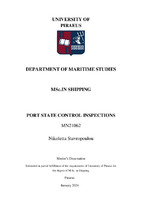Port state control inspections

Master Thesis
Author
Stavropoulou, Nikoletta
Σταυροπούλου, Νικολλέτα
Date
2024-01View/
Keywords
Port state control ; Inspection ; Safety net ; MoUs ; Foreign portsAbstract
Regular surveys and inspections of ships are conducted to ensure their safety and seaworthiness. As shipping laws become more stringent each year, ocean-going vessels must undergo a series of inspections to meet minimum requirements for continued navigation. The main objective of this dissertation is to analyze the external inspections performed on ships to ensure the safety of the ship, crew, ports and environmental protection and sustainability. The primary types of inspections are as follows: the Flag Inspections, the Port State Control, the Vetting Inspections, the Classification Society, the TMSA and the Green Award Inspections. The emphasis would be on the port state control inspection process, when, how and why countries formalized this process, as did the general concepts underlying it. These inspections were designed to supplement flag state implementation, but experience has shown that they may be very successful. PSC authorities from different countries sign MoUs to establish a framework for cooperation and coordination when inspecting foreign-flagged vessels that visit their ports. By collaborating and sharing information, PSC authorities can target higher-risk vessels more effectively and ensure consistent enforcement of international maritime regulations. Port state control acts as a safety net, to determine low-quality ships. Port State Control plays a critical role in safeguarding the marine environment by ensuring that ships adhere to international environmental regulations and standards while visiting foreign ports. By holding non-compliant ships accountable, it helps minimize the impact of shipping activities on marine ecosystems and coastal communities.

